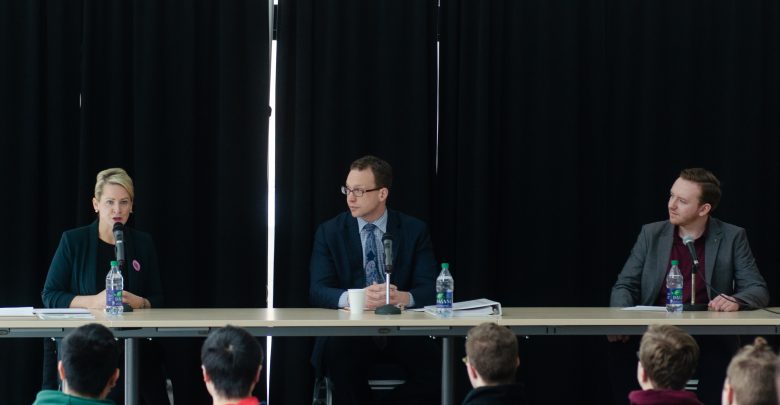NDP and Alberta Party candidates talk post-secondary education in SUB
 Richard Bagan
Richard BaganDeferred maintenance, mental health funding, and student employment were some of the things discussed by two candidates for the upcoming provincial election at a candidates’ forum in the Students’ Union Building.
The forum was organized on January 24 as part of GovWeek 2019, a week-long event organized by the Students’ Union to inform students about university governance and to inspire potential candidates for student politics. Around 70 people attended.
Two of the candidates present were Katherine O’Neill, Alberta Party candidate for Edmonton-Riverview, and Minister of Advanced Education Marlin Schmidt, who will be running as the Alberta New Democratic Party’s candidate for Edmonton-Gold Bar in the 2019 provincial election.
According to Akanksha Bhatnagar, SU vice-president (academic) and organizer of GovWeek, the Alberta Liberal Party and United Conservative Party were invited to attend the forum multiple times, but neither party sent a representative.
“We really wish every party could have a candidate here,” Bhatnagar said. “Unfortunately, we were told they were unable to make it.”
Giving universities stable funding to address deferred maintenance
The Minister of Advanced Education reinforced the party’s track record for addressing deferred maintenance while the Alberta Party candidate focused on budget planning as a means of providing institutions more certainty.
Both candidates discussed deferred maintenance on university campuses, which is when components of the university’s infrastructure are scheduled to be repaired but aren’t, resulting in costlier future repairs. Currently, the U of A faces $1 billion in deferred maintenance.
Schmidt said the NDP recognizes the challenges of deferred maintenance and pointed to the ongoing $239-million renovation project in the Dentistry Pharmacy Building.
“We [the NDP] have a strong track record of addressing infrastructure needs at the U of A,” he said. “We will continue to invest in the future.”
O’Neill said deferred maintenance has become a significant issue for universities due to uncertainty in provincial budgeting. She said three-year budget cycles with differing funding commitments from provincial governments are ineffective since university administrators are not able to fully plan maintenance projects.
“A three-year funding cycle for a university is unacceptable,” she said. “If you commit to making a plan to fix the issue, then confront the issue and put the funds to work.”
Further, O’Neill expressed concern over the SU’s proposed student space levy, which could see students paying a fee of $9 in Fall 2019 and increasing by $9 per term thereafter to $54 to renovate non-academic spaces. She said that previous governments are to blame for the predicament the Students’ Union is facing.
“That is a creative solution,” O’Neill said. “It is not a long term solution to these big bills… Governments should be paying attention to infrastructure needs.”
Differences in mental health resources for post-secondary
Alberta Party candidate for Edmonton-Riverview
Schmidt said the NDP believes in a vision which balances public and university resources in addressing mental health concerns. On the other hand, O’Neill said students should not have to go off campus to access help.
According to Schmidt, the NDP’s vision for mental health resources is the result of consultation with health care providers and university administrators. While the NDP commits to supporting mental health care on campuses, Schmidt said that the options available at public health centres should also be funded.
“Not only should we provide adequate supports here on campus, we need adequate supports in the public health care system,” Schmidt said. “We cannot expect a university or an SU to be a mental health care provider.”
O’Neill said the drive to push mental health supports off campus is not ideal for students. She added that not all students are close to supports offered at public health centres.
“When people have mental health issues, sometimes it is in that access and proximity to the help that makes all the difference in the world,” she said.
Candidates promise to elevate STEP
Both politicians at the forum recognized the importance the Summer Temporary Employment Program (STEP) plays in helping student employability, either during their degree or upon graduation. While Schmidt highlighted NDP commitments that have already been completed, O’Neill said STEP needs further refinement to reflect student needs.
O’Neill said that while she applauds the NDP for resurrecting the program after the previous Progressive Conservative governments cancelled it, more improvements need to be made.
“Degree-related experience is really important,” she said. “Further, STEP usually only works in the summer. Students need employment outside of the summer time. We really need to expand upon this.”
Meanwhile, Schmidt listed some of the improvements the government has made to the STEP program, including expanding enrollment opportunities to students from more academic backgrounds and increasing the number of positions supported through the program.
“We have made improvements to STEP,” he said. “This is a program students resoundingly use and want. We will continue to support and expand it.”






